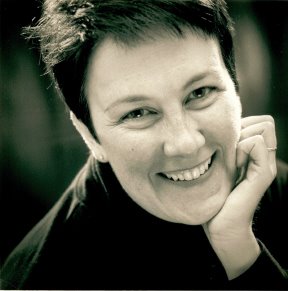To the Beat of a New, Similar Drum
 Philadelphia-based composer Jennifer Higdon’s brand-new Percussion Concerto (it was premiered on November 25th in Philadelphia) rose slowly to life under the hands of soloist Colin Currie. Amplified new-agey marimba sounds wafted about until the orchestra ripped through the calm with tortured strength. With that raucous orchestral backup (Ms. Higdon says “meaty,” I say “thumping”… if not necessarily in a bad way), Mr. Currie moved from one percussion station to the next. From right to left he took his excess energy out on a vibraphone, marimba, a collection of wood blocks and cowbells, and a drum kit as you’d expect it in a rock concert. While he gets to use these toys up front, the hyperactive Philadelphia Orchestra’s percussion section under their Maestro Christoph Eschenbach, too, got in on the action. The rumbling, rambling finale of this one-movement concerto ended with a marimba/piano-driven race preceding Colin Currie’s free-wheeling cadenza on the drum kit. Perhaps it is unfair to judge the work upon one hearing alone… but that alone says something about the quality of the work. I have heard music of Higdon’s - a friend of Marin Alsop's - on recordings that I liked much better – although the very enthusiastic audience reaction in the Kennedy Center’s Concert Hall suggested great (initial) popularity. That the composer was present in the audience may have helped a little for such a reception, too.
Philadelphia-based composer Jennifer Higdon’s brand-new Percussion Concerto (it was premiered on November 25th in Philadelphia) rose slowly to life under the hands of soloist Colin Currie. Amplified new-agey marimba sounds wafted about until the orchestra ripped through the calm with tortured strength. With that raucous orchestral backup (Ms. Higdon says “meaty,” I say “thumping”… if not necessarily in a bad way), Mr. Currie moved from one percussion station to the next. From right to left he took his excess energy out on a vibraphone, marimba, a collection of wood blocks and cowbells, and a drum kit as you’d expect it in a rock concert. While he gets to use these toys up front, the hyperactive Philadelphia Orchestra’s percussion section under their Maestro Christoph Eschenbach, too, got in on the action. The rumbling, rambling finale of this one-movement concerto ended with a marimba/piano-driven race preceding Colin Currie’s free-wheeling cadenza on the drum kit. Perhaps it is unfair to judge the work upon one hearing alone… but that alone says something about the quality of the work. I have heard music of Higdon’s - a friend of Marin Alsop's - on recordings that I liked much better – although the very enthusiastic audience reaction in the Kennedy Center’s Concert Hall suggested great (initial) popularity. That the composer was present in the audience may have helped a little for such a reception, too. Following the concerto – it seemed half an hour long, but I take it that it was only a twenty-minute work – was one of the trustiest workhorses in the repertoire, Beethoven’s Eroica. Like two lashed slaps in the face of the audience Eschenbach placed the two pillars at the third symphony’s entrance that lead unto the path of the Romantic symphony as we know it. It was one of the few moments that I thought stood out as particularly novel or exciting in a performance that was more pleasing than anything else. Like his predecessor (one of the greatest and least noticeable maestros) Wolfgang Sawallisch, I don’t suppose that the former conductor of the Houston SO approaches Beethoven with a particular agenda. That is neither good nor bad in itself. Trying to make Beethoven sound new or ‘different’ can be great (Zinman, Gardiner, Harnoncourt, and in a very different and old-fashioned way, Barenboim) – but can just as easily become a painful miscalculation.
Following the concerto – it seemed half an hour long, but I take it that it was only a twenty-minute work – was one of the trustiest workhorses in the repertoire, Beethoven’s Eroica. Like two lashed slaps in the face of the audience Eschenbach placed the two pillars at the third symphony’s entrance that lead unto the path of the Romantic symphony as we know it. It was one of the few moments that I thought stood out as particularly novel or exciting in a performance that was more pleasing than anything else. Like his predecessor (one of the greatest and least noticeable maestros) Wolfgang Sawallisch, I don’t suppose that the former conductor of the Houston SO approaches Beethoven with a particular agenda. That is neither good nor bad in itself. Trying to make Beethoven sound new or ‘different’ can be great (Zinman, Gardiner, Harnoncourt, and in a very different and old-fashioned way, Barenboim) – but can just as easily become a painful miscalculation.
Emily Cary, Higdon's percussive premiere (The Examiner, November 23) |




















































